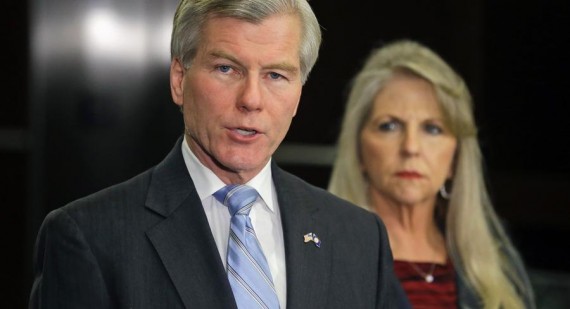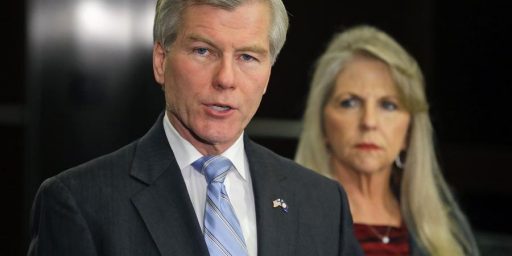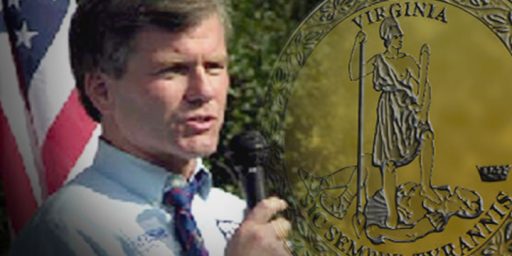Supreme Court Appears Sympathetic To Bob McDonnell’s Appeal
Former Virginia Governor Bob McDonnell's fate lies the hands of the Supreme Court.
Yesterday, the Supreme Court heard oral argument in the appeal of former Virginia Governor Bob McDonnell in his appeal of his conviction on multiple charges of public corruption, and at least initially it appears that the Justices are sympathetic to the argument being made on his behalf that the charges against him represent an overly broad interpretation of Federal law by prosecutors, the Judge who presided over the case, and the jury that purported to decide his fate:
WASHINGTON — The Supreme Court on Wednesday seemed ready to side with Bob McDonnell, the former governor of Virginia who was convicted of public corruption and faces two years in prison. Justices across the ideological spectrum said the laws under which he had been convicted gave prosecutors too much power to say that routine political favors amounted to corruption.
“It puts at risk behavior that is common,” said Justice Stephen G. Breyer. “That is a recipe for giving the Justice Department and prosecutors enormous power over elected officials.”
Mr. McDonnell, a Republican, was prosecuted on charges that he had used his office to help a businessman, Jonnie R. Williams Sr., who had showered the governor and his wife with luxury products, loans and vacations worth more than $175,000. The gifts themselves were legal, and the question in the case was whether they were part of a corrupt bargain in which Mr. McDonnell reciprocated by using the power of his office to help Mr. Williams.
Mr. McDonnell, who attended the argument on Wednesday, arranged meetings for and attended events with his benefactor. But Mr. Williams, whose company made a diet supplement, did not have any real success in obtaining support for his product from the state. A jury found that Mr. McDonnell’s actions amounted to corruption, and a federal appeals court upheld the conviction.
Noel J. Francisco, a lawyer for Mr. McDonnell, said his client should not have been convicted, as he did not “make a government decision or urge someone else to do so.” The corruption laws, he added, were “not meant to be comprehensive codes of ethical conduct.”
Michael R. Dreeben, a lawyer for the federal government, said such a narrow definition was “a recipe for corruption” that would “send a terrible message to citizens.”
Justice Breyer responded that “I’m not in the business of sending messages in a case like this,” adding, “I’m in the business of trying to figure out the structure of the government.”
Justice Anthony M. Kennedy also sounded frustrated, saying that “the government has given us no workable standard” to distinguish political favors from criminal acts.
Mr. Dreeben took a hard line, saying that a vacation or an expensive lunch traded for arranging a meeting could be sufficient. But he added that it was hard to prove criminal intent.
Justice Kennedy reacted with sarcasm. “You’re going to tell the senators, the officials with the lunches, that ‘don’t worry, the jury has to be convinced beyond a reasonable doubt,'” he said.
Some justices said that even the standard urged by Mr. McDonnell’s lawyer converted too much ordinary conduct into a crime.
“The word ‘influence’ is too broad,” Justice Breyer said, “because every day of the week politicians write on behalf of constituents letters to different parts of the government, saying, ‘Will you please look at the case of Mrs. So-and-so who was evicted last week?'”
Justice Kennedy said he would limit the definition of unlawful corruption to the “exercise of governmental power to require citizens to do or not to do something, or to shape the law that governs their conduct.” Asking another official to have a meeting with a donor, he suggested, was not enough.
Justice Ruth Bader Ginsburg, who seemed sympathetic to the government, probed the implications of such a standard, asking Mr. Francisco whether it would be lawful to charge $1,000 for a meeting.
“If there’s no indicia that you’re actually trying to influence the outcome, and it really is just a meeting, yes,” Mr. Francisco said.
Chief Justice John G. Roberts Jr. said it might matter who was arranging the meeting. “If it’s the president who calls and says, ‘I want you to look at this matter for my constituent,’ that might exercise considerably more influence,” he said.
But Chief Justice Roberts was considerably more animated and skeptical in questioning Mr. Dreeben, the government’s lawyer. The chief justice quoted from a supporting brief filed by several former White House counsels of both parties who warned that if the decision were upheld, it would “cripple the ability of elected officials to fulfill their role in our representative democracy.”
“I think it’s extraordinary that those people agree on anything,” Chief Justice Roberts said.
Last year, the Supreme Court allowed Mr. McDonnell to stay out of prison while the court considered whether to hear his case, McDonnell v. United States, No. 15-474. That unusual order was a powerful hint that the court might be inclined to rule in his favor.
In their Supreme Court briefs, Mr. McDonnell’s lawyers relied on the Citizens United decision in 2010, in which the Supreme Court said that “ingratiation and access” were “not corruption.” That year, the court ruled in favor of a former Enron executive, Jeffrey K. Skilling, saying that a federal anticorruption law governing “honest services” applied only to bribes and kickbacks.
On Wednesday, Chief Justice Roberts noted that three members of the court — Justices Kennedy, Clarence Thomas and Antonin Scalia, who died in February — would have gone further in the Skilling case and ruled that the law was unconstitutionally vague. “Maybe the experience we’ve had here,” the chief justice said, “and the difficulty of coming up with clear enough instructions suggests that the caution the court showed at that point” — in construing the law narrowly rather than striking it down — “was ill-advised.”
Lyle Denniston comments on the oral argument:
Although the Chief Justice seemed to suggest at one point that the corruption theory used against McDonnell might actually be found to be too vague to satisfy the Constitution, most of the effort that he and his colleagues made was in the search for a “limiting principle.” If one were not found, Justice Breyer suggested, nearly every politician could be put at legal risk and the executive branch would be turned into the morality superintendent of political life in America.
Justice Clarence Thomas said nothing during the argument, but the other seven were actively engaged. And, by the end of the hour, it was difficult to find any Justice willing to come willingly to the prosecutors’ defense. (Justice Sonia Sotomayor might have been the exception, but even that was not clear.) It turned out, in fact, to be a very tough day for Deputy U.S. Solicitor General Michael R. Dreeben, who tried to “push back,” as he put it, but appeared to be drawing little support. (It was Dreeben’s one-hundredth argument before the Court, which the Chief Justice noted with thanks in brief remarks as he called Dreeben back to the lectern.)
McDonnell’s lawyer, Washington attorney Noel J. Francisco, had to work his way through a wide variety of hypothetical scenarios proposed by the Justices as they sought to understand the evidence used against McDonnell, and why that might — or might not — add up to a crime. But, the longer Francisco stood at the lectern, the more promising his challenge seemed. (Francisco, in his one moment of obvious discomfort, mistakenly referred to Justice Ruth Bader Ginsburg as “Justice O’Connor,” something that Ginsburg wryly noted had not happened “in quite some time.” Francisco tried hard to apologize.)
(…)
At the center of McDonnell’s challenge is whether he performed any “official acts” on behalf of Williams’ interests in return for all of the largesse provided for the governor, his wife, and their family.
It was that single phrase, “official acts,” that was the target of the most skeptical of the Justices on Wednesday. Justice Kennedy ridiculed it as reaching even a janitor who took a bottle of beer for doing some extra cleaning in an office. Justice Breyer said it was so open-ended that no member of Congress could ask any government official to look into the private matter of interest for a political donor. Chief Justice Roberts marveled at the “extraordinary” fact that a bevy of former White House staff lawyers who had served several presidents submitted an amicus brief warning of the dreadful consequences for democracy if the McDonnell verdict stood.
Justices Ginsburg and Elena Kagan spent most of their time trying to work their way through the specifics of the evidence in the case, but there was little in their remarks that would please prosecutors using such evidence to prove illegal bribery or corruption. There was nothing in a few questions from Justice Samuel A. Alito, Jr., to suggest that he would support the McDonnell verdict.
As I’ve said before, one needs to be cautious when trying to guess the direction a case may take based on oral argument. Sometimes, the questions a Judge asks in such as situation, and the comments that they make, are aimed at either playing ‘devil’s advocate’ to explore the arguments being made by counsel, or to address some point being made by one of their fellow Judges. It’s also the case, though, that when oral argument leans heavily in one direction or another it may very well be an indication of which direction particular Justices are leaning and, often, that can be used to roughly predict the outcome of a case. In this case, the questioning from at least four of the eight Justices seemed to indicate deep skepticism about the legal theory behind the Federal Government’s prosecution of McDonnell and the extent to which the case stretches the definition of what constitutes an “official act” that would qualify as the kind of conduct performed in exchange for gifts that could lead to criminal charges.This is an argument that was extensively litigated before McDonnell’s trial began, of course, with many legal analysts, including a bipartisan group of former Virginia Attorneys General, joining the defense in making essentially the same argument that McDonnell is making now. The trial court rejected that argument and, due to the way Federal Courts generally work, there was no opportunity for a pre-trial appeal of the legal basis for the charges that the prosecution had brought.
Assuming that the Justices do end up siding with McDonnell, there are a number of directions the case could go. The Court could decide, for example, that the underlying statute that the prosecution relied on to prosecute McDonnell is unconstitutionally vague or that it was interpreted in an unconstitutional manner in McDonnell’s case. In those situations, the conviction would be overturned and McDonnell would be a free man. Alternatively, the Court could decide to grant McDonnell’s request for a new trial. In that event, the case would go back to Richmond for a new trial, but it’s likely that the Court would limit the interpretation of the statute in question to such an extent that it would be far more difficult for prosecutors to win a conviction. The final outcome, of course, is that the Justices could uphold the conviction, or end their deliberations in a 4-4 tie. In that case, the rulings below would stand and McDonnell would eventually have to begin serving his sentence. We should know which way the Court goes by the end of June.
Here’s the transcript of yesterday’-s argument:






Seriously?
Justice Breyer doesn’t think it makes a difference whether the letter from Mrs. So-and-so contained a check for $50,000? Seriously?
I would be fascinated to hear Roberts and Breyer theorize about why US businesses pay literally billions of dollars per year to lobbying firms, in order to get nothing more than meetings with politicians. If meetings have no intrinsic value, then clearly those firms are just pouring money down a hole, right?
We desperately need more SCOTUS justices who have lived in the real world at some point.
@Argon: It’s not corruption, it’s “political favors” now.
In other words, as long as you’re good at it, it’s not wrong. There’s a rule of thumb for you when it comes to gray legal areas.
Yeah, extra cleaning in an office, that would somehow taint our politics to the point of needing a law against it. I get he’s trying to reduce to absurdity here, but his example is too absurd and does deductive logic a disservice.
Hilarious. There were amicus briefs in the Hobby Lobby case noting from a scientific standpoint most of the drugs Hobby Lobby claimed to believe were abortifacients were, in fact, not. Roberts didn’t give a shit then, but get a bunch of lawyers to agree on something and he’s gobsmacked!
Well, this is the same gaggle who decided that money == free speech.
We’re just working towards the logical conclusion of such an axiom, which is that bribery == business as usual.
So, a bunch of Harvard and Yale law school graduates who have worked in government service all of their careers are having trouble understanding how to define corruption. Hmmm…
Nope, I’m just not surprised, sorry.
@grumpy realist: Money:free speech::bribery:business as usual. If money == free speech, then bribery==business as usual.
Yup. Both forms are valid, so the proposition stands.
I say we reduce his sentence to a trans-vaginal ultrasound and be done with it.
Well @C. Clavin: wins this thread.
“Official acts?”
He’s a PUBLIC OFFICIAL. He served at the pleasure of the population of Virginia.
Contra SCOTUS, are they saying there are “unofficial acts” he can perform while serving as governor? Does the corrupting influence of money and gifts, that are given solely to these public officials, and not janitors, not count as bribery unless they come in cartoon bags with dollar signs on them?
All of the sudden I have the extremely strong urge to examine the finances, tax returns, and houses of our Supreme Court Justices…
@grumpy realist:
Not exactly. One is missing.
It’s ironic that it may well turn on a 4/4 decision sending Bob, a guy who surely believes “the public” should decide on the next justice, to jail for two years.
This is the result of submitting ideologues to the Supreme Court rather than looking for people that are steady and have real world experience. Merrit Garner appears to be such a person, but the Repubs are gambling that they can use their control of the Senate to delay until a Republican is president next January*. In my lifetime Democrats have tended to submit more ideologically neutral candidates, and ones that have had working class experience. Republicans have submitted much more isolated and ideologically rigid candidates.
*Nah, that’s not really what they are doing. They are delaying so that when a Democratic Senate and President Hillary Clinton install someone ideologically to the left, they can tell their primary voters that they voted against it. In other words, they don’t really care that much about the result as long as their fingerprints aren’t on it.
It seems to me the Supremes always end up talking about the appearance of corruption, even when dealing with actual, blatant corruption. But if they are really worried about the appearance of corruption, shouldn’t the standard be, “Caesar’s wife must be above suspicion.”?
Doug seems to be skeptical of the idea that a sitting governor taking $175,000 in “gifts” from constituent in return for helping him in his business affairs meets the corruption standard. Yet when private citizen Hillary Clinton was making big money for speaking at events, Doug saw that as presumptive evidence of corruption. Funny that.
The jury seemed to have no problem with the corruption standard , but that was probably because they were ordinary citizens who didn’t realize that money was speech, but thought that money was used to pay for things- like political favors
So plaintiff is suing Merecedes Benz for unsafe seat belts, The judge wakes up to find a brand new 500 SL that was “donated” to the judge’s church’s charity for homeless people. So he gets to drive it for the duration of the 3 year lease as he is also the head of the “charity”.
I guess the judge does not have to worry about “being corrupted” right you out of touch GOP SCOTUS douchebags.